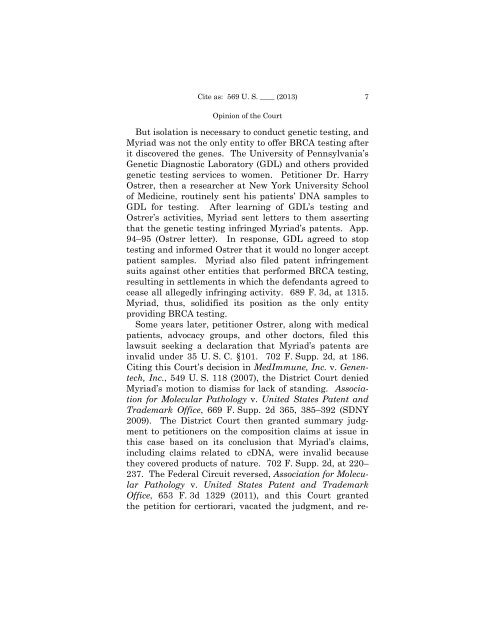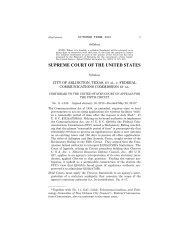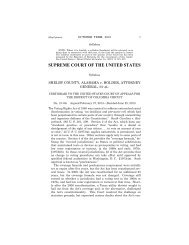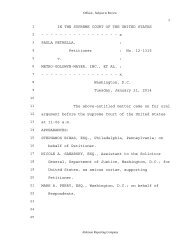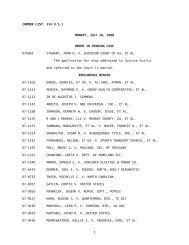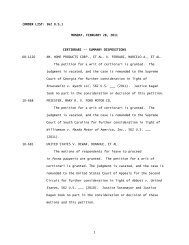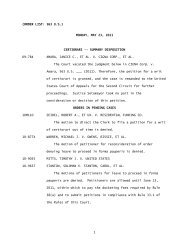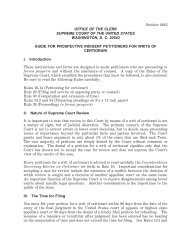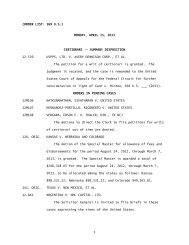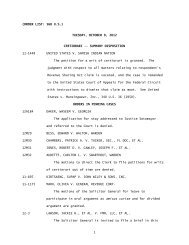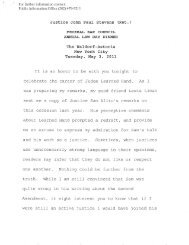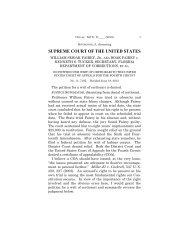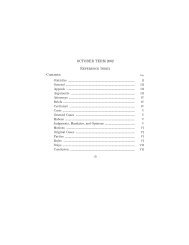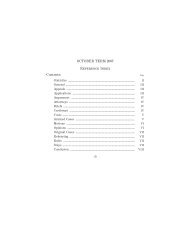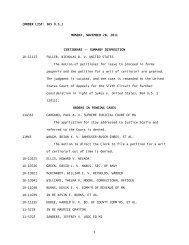12-398 Association for Molecular Pathology v. Myriad Genetics, Inc ...
12-398 Association for Molecular Pathology v. Myriad Genetics, Inc ...
12-398 Association for Molecular Pathology v. Myriad Genetics, Inc ...
You also want an ePaper? Increase the reach of your titles
YUMPU automatically turns print PDFs into web optimized ePapers that Google loves.
Cite as: 569 U. S. ____ (2013)<br />
Opinion of the Court<br />
But isolation is necessary to conduct genetic testing, and<br />
<strong>Myriad</strong> was not the only entity to offer BRCA testing after<br />
it discovered the genes. The University of Pennsylvania’s<br />
Genetic Diagnostic Laboratory (GDL) and others provided<br />
genetic testing services to women. Petitioner Dr. Harry<br />
Ostrer, then a researcher at New York University School<br />
of Medicine, routinely sent his patients’ DNA samples to<br />
GDL <strong>for</strong> testing. After learning of GDL’s testing and<br />
Ostrer’s activities, <strong>Myriad</strong> sent letters to them asserting<br />
that the genetic testing infringed <strong>Myriad</strong>’s patents. App.<br />
94–95 (Ostrer letter). In response, GDL agreed to stop<br />
testing and in<strong>for</strong>med Ostrer that it would no longer accept<br />
patient samples. <strong>Myriad</strong> also filed patent infringement<br />
suits against other entities that per<strong>for</strong>med BRCA testing,<br />
resulting in settlements in which the defendants agreed to<br />
cease all allegedly infringing activity. 689 F. 3d, at 1315.<br />
<strong>Myriad</strong>, thus, solidified its position as the only entity<br />
providing BRCA testing.<br />
Some years later, petitioner Ostrer, along with medical<br />
patients, advocacy groups, and other doctors, filed this<br />
lawsuit seeking a declaration that <strong>Myriad</strong>’s patents are<br />
invalid under 35 U. S. C. §101. 702 F. Supp. 2d, at 186.<br />
Citing this Court’s decision in MedImmune, <strong>Inc</strong>. v. Genentech,<br />
<strong>Inc</strong>., 549 U. S. 118 (2007), the District Court denied<br />
<strong>Myriad</strong>’s motion to dismiss <strong>for</strong> lack of standing. <strong>Association</strong><br />
<strong>for</strong> <strong>Molecular</strong> <strong>Pathology</strong> v. United States Patent and<br />
Trademark Office, 669 F. Supp. 2d 365, 385–392 (SDNY<br />
2009). The District Court then granted summary judgment<br />
to petitioners on the composition claims at issue in<br />
this case based on its conclusion that <strong>Myriad</strong>’s claims,<br />
including claims related to cDNA, were invalid because<br />
they covered products of nature. 702 F. Supp. 2d, at 220–<br />
237. The Federal Circuit reversed, <strong>Association</strong> <strong>for</strong> <strong>Molecular</strong><br />
<strong>Pathology</strong> v. United States Patent and Trademark<br />
Office, 653 F. 3d 1329 (2011), and this Court granted<br />
the petition <strong>for</strong> certiorari, vacated the judgment, and re-<br />
7


